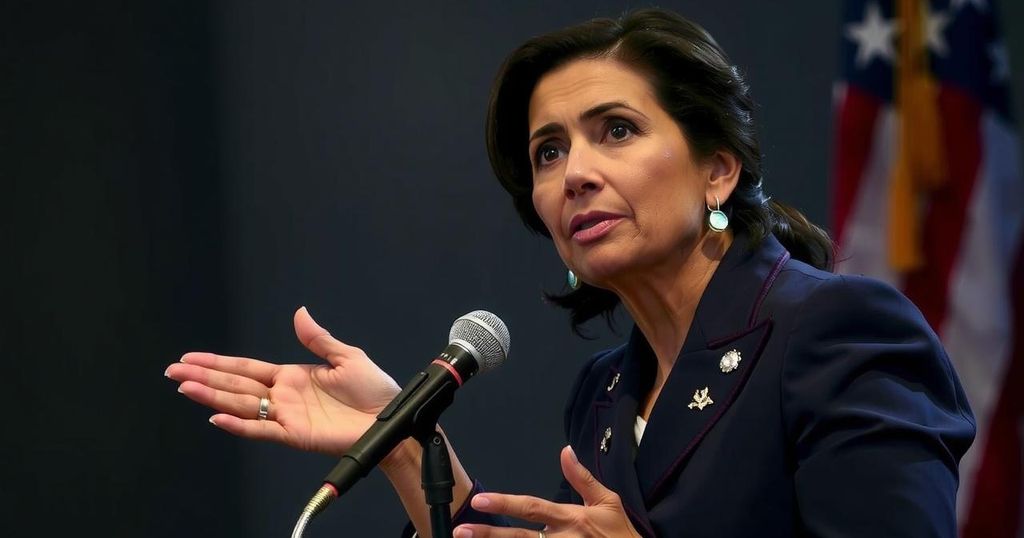Tulsi Gabbard’s Intelligence Nomination Sparks Controversy and Concerns
Tulsi Gabbard faces scrutiny after being nominated by Donald Trump for director of national intelligence due to her controversial past, including a meeting with Assad and statements on Russia’s invasion of Ukraine. Criticism arises over potential risks to international intelligence cooperation, with fears that her views may hinder U.S. relations with allies. Supporters call for an open dialogue, while the Senate confirmation process remains uncertain.
Former Congresswoman Tulsi Gabbard has come under renewed scrutiny following her selection by President-elect Donald Trump to lead the United States intelligence community as director of national intelligence (DNI). Gabbard’s previous controversial engagement with Syrian President Bashar al-Assad in 2017 and her statements regarding Russia’s actions in Ukraine have raised significant concerns among former national security officials and lawmakers. Critics suggest that her appointment could jeopardize the cooperation between U.S. intelligence agencies and their foreign partners due to her perceived inclination toward Russian and Syrian narratives.
Trump’s defense of Gabbard highlights her military background as a lieutenant colonel in the Army Reserve, asserting that she possesses a “fearless spirit” that could bolster the intelligence community. However, her past statements, which some view as echoing Kremlin propaganda, have led key figures such as former U.N. Ambassador Nikki Haley to question her capability. Haley articulated that “this is not a place for a Russian, Iranian, Syrian, Chinese sympathiser,” indicating a broad skepticism regarding Gabbard’s fitness for the position.
Former officials in the intelligence community express concerns that Gabbard’s viewpoints could undermine critical intelligence diplomacy between the U.S. and its allies, particularly if her perspective on adversaries like Assad and Putin diverges from established U.S. positions. While some maintain that the longstanding security alliances will endure, the discomfort with her nominated role may complicate future collaborations, according to those in the field.
Gabbard’s nomination may encounter resistance during Senate confirmation, given her previous expressions that seem to favor adversaries of the U.S. Congress members, such as Elissa Slotkin, a former CIA officer, voiced worries about her portrayal of international concerns. Nevertheless, there are supporters among Republican senators who advocate for direct dialogue prior to making judgments about her suitability for the Director of National Intelligence role. This appointment remains critical as the DNI holds significant influence in shaping national security assessments for the president and the country.
The appointment of Tulsi Gabbard to the position of director of national intelligence has ignited controversy primarily due to her previous foreign policy positions and actions. In 2017, she met with Syrian President Bashar al-Assad, stirring criticism for questioning U.S. intelligence regarding the Assad regime’s use of chemical weapons. Gabbard has adopted a generally anti-war stance and advocated for minimal U.S. military intervention globally, positions that are viewed with great skepticism by policymakers who prioritize American security interests. Her comments during Russia’s invasion of Ukraine, particularly those echoing Russian narratives, have further complicated her reputation among politicians and national security experts, raising alarms about her potential influence on vital intelligence operations.
In summary, Tulsi Gabbard’s nomination as director of national intelligence presents a complex backdrop of scrutiny regarding her foreign policy viewpoints. Her past actions, criticisms of U.S. military involvement, and controversial statements on adversarial nations have led to concerns about her impact on international intelligence cooperation. While some Republican senators express support, it is evident that her confirmation process will face significant challenges amid doubts regarding her alignment with traditional U.S. intelligence perspectives and diplomatic strategies.
Original Source: www.bbc.com




Post Comment